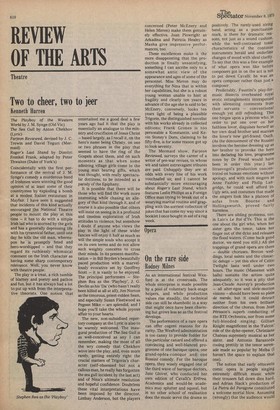REVIEW OF THE ARTS
Theatre
Two to cheer, two to jeer
Kenneth Hurren
The Playboy of the Western World by J. M. Synge (Old Vic) The Sea Gull by Anton Chekhov (Lyric) Farjeon Reviewed, devised by J. C. Trewin and David Toguri (Mermaid) Roger's Last Stand by Dimitri Frenkel Frank, adapted by Peter Thwaites (Duke of York's) Coincidentally with the first performance of the revival of J. M. Synge's comedy a murderous band of Irishmen were winning the good opinion of at least some of their countrymen by exploding a bomb at a modest Italian restaurant in Mayfair. I have seen it suggested that incidents of this kind actually encouraged the National Theatre people to mount the play at this time — it has to do with a simple Irish lad who is scorned by the girls and has a generally depressing life with his tyrannical father, until one day he kills the old man, whereupon he is promptly feted and hero-worshipped — and that they regard its ruthlessly whimsical comment on the Irish character as having some sharp contemporary relevance. Well, you never know with theatre people.
The play is a treat, a rich tumble of blarney and poetry and pathos and fun, but it has always had a lot to put up with from the interpretative theorists. One notion that entertained me a good deal a few years ago had it that the play is essentially an analogue to the ministry and crucifixion of Jesus Christ — based largely, as I recall it, on the hero's name being Christy, on one or two phrases in the play that seemed to have the ring of the Gospels about them, and on such moments as that when some admiring village girls come to the young man bearing gifts, which was thought, with really spectacular dottiness, to be intended as a parody of the Epiphany.
It is possible that there will be those who will find the work more interesting while chasing an allegory of that kind through it, and of course it is also possible that others will insist on seeing in it a profound and timeless exploration of Irish attitudes to violence; but somehow I doubt if anyone who views the play in the light of these wider fancies will enjoy it half as much as will the simple souls who accept it on its own terms and do not allow such weighty concerns to cross their minds. In its present manifestation — in Bill Bryden's beautifully paced production with a marvellously evocative set by Geoffrey Scott — it is vastly to be enjoyed. The principal performers — Stephen Rea as the 'Playboy', J. G. Devlin as his 'Da' (who hasn't really been killed at all at all), Jim Norton as the timorous, priest-ridden Sean, and especially Susan Fleetwood as Pegeen Mike — are splendid, and I hope you'll take the whole joyous affair to your hearts.
The new, non-subsidised repertory company at the Lyric is also to be warmly welcomed. The inaugural production of The Sea Gull is as well-conceived as any I can remember, making the most of all the wry comedy that Chekhov wove into the play, and, even more rarely, getting entirely right the crucial matters of Trigorin's character (self-obsessed but not a callous man, he really has forgotten the sea gull incident by the last act) and of Nina's ultimate resolution and hopeful confidence. Doubtless these vital interpretations have been imposed by the director, Lindsay Anderson, but the players concerned (Peter McEnery and Helen Mirren) make them genuinely effective. Joan Plowright as Arkadina and Patricia Healey as Masha give impressive performances, too.
These excellences make it the more disappointing that the production is finally unsatisfying, something I can ascribe only to a somewhat antic view of the appearance and ages of some of the personnel. Miss Mirren may do everything for Nina that is within her capabilities, but she is a robust young woman unable to hint at fragility and clearly ten years in advance of the age she is said to be; McEnery, conversely, looks ten years light of being a plausible Trigorin, the distinguished novelist with his works already in collected editions; Frank Grimes is too personable a Konstantin, and Kevin Stoney's Dorn, claiming to be fifty-five, is for some reason got up to look seventy.
The Mermaid show, Farjeon Reviewed, surveys the career of a writer of pre-war revues, to whose wit and talent extravagant tributes are paid. Unhappily they are at odds with every line of his work vouchsafed us; and I cannot be substantially more encouraging about Roger's Last Stand, which features Leslie Phillips as a Foreign Office man trying to break out of a wearying marital routine and grappling with the.sorriest collection of jokes that has come my way since a booklet I once bought in aid of a rag week.
































 Previous page
Previous page